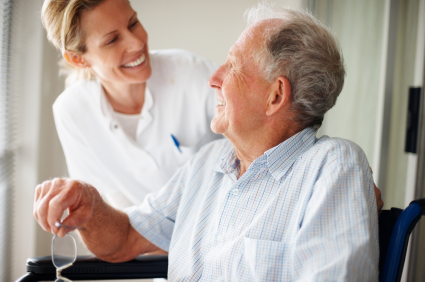Strokes – information and care in the home

Information on Stroke
Strokes affect around 152,000 people every year in the UK, and the country has over 1.1million stroke survivors. Though the severity of a stroke can depend on the individual’s age and lifestyle, it can often leave you with severely impaired speech and mobility, often only in the short-term but occasionally for life.
CAUSES AND PREVENTION
A stroke is the result of impaired blood flow to the brain, causing cell death. There are two main types: An ischemic stroke occurs due to poor blood flow, while an hemorrhagic stroke is the result of internal bleeding. The onset of a stroke is very sudden. High blood pressure is the major cause of stroke, while smoking, alcohol consumption and a poor diet can all be contributing factors.
Unlike degenerative conditions such as multiple sclerosis or Parkinson’s, there are steps you can take to dramatically reduce the chances of experiencing a stroke. Regular exercise can reduce the risk by around 26%. Losing weight if you are obese or overweight, maintaining a healthier diet and quitting smoking are also advisable, if any of these apply.
SYMPTOMS
Experts recommend the FAST system for helping to identify when someone is suffering or about to suffer a stroke. This involves checking for facial weakness, arm drift (if they lift both arms, does one begin to droop involuntarily?) and speech (are they having difficulty speaking or understanding speech?), with the T standing for time – if any of these symptoms are showing, you should contact emergency services as quickly as possible.
DIAGNOSIS
Because of the nature of the condition, a stroke is usually diagnosed very quickly, providing the person suffering the stroke is given immediate medical attention. At the hospital, they will usually receive an MRI or CT scan, along with a multidisciplinary assessment to identify stroke as the cause of the symptoms, and begin the appropriate treatment immediately.
TREATMENT
Treatment for those recovering from a stroke will vary, depending on the severity of the attack. Physio and speech therapy are an essential part of stroke treatment, which in this country is usually administered at a specialist stroke unit. Many of those who experience strokes also suffer from some form of depression, so psychologists and social workers may play a role in their rehabilitation.
CARE
People affected by stroke will often have mobility issues, either in the short or long-term, and so will often require care. A live-in carer can help them to perform everyday tasks – getting dressed, maintaining personal hygiene, cooking meals and performing errands – without leaving the comfort of their own home. They can also help deal with stroke-related matters, such as hydration, skincare and monitoring blood pressure.
If you are caring for a loved one who has experienced a stroke, a respite carer can provide you with a much-needed break from your daily care routine, either to enjoy some time to yourself or perform any other tasks which your routine makes difficult.
If you would like further information about the kind of care services we provide for those recovering from a stroke, go to the Home Care Services tab on our home screen. Alternatively, you can contact Everycare directly via our online contact form, or by calling our office on 01179 586 235


